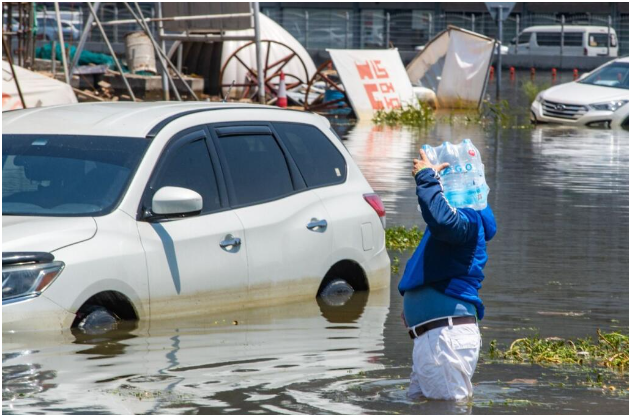UAE Doctors Address Rise in Ailments Amid Rains and Floods with Vital Safety Advice
The United Arab Emirates (UAE) is no stranger to the occasional deluge, but recent heavy rains and floods have caught the attention of both residents and healthcare professionals alike. As the country grapples with the aftermath of these weather events, doctors are reporting a concerning uptick in diseases associated with waterborne pathogens and vector-borne illnesses. In response to these emerging health challenges, medical experts are stepping forward to offer essential tips and guidance on staying safe amidst the adverse weather conditions.
The sudden onset of heavy rains and subsequent flooding across various regions of the UAE has raised alarm bells among healthcare professionals. Dr. Fatima Ahmed, a leading infectious disease specialist at a prominent hospital in Dubai, highlights the increased risk of waterborne diseases such as gastroenteritis and leptospirosis during periods of heavy rainfall and flooding. Contaminated water sources and poor sanitation can contribute to the spread of these illnesses, posing a significant health threat to individuals exposed to floodwaters.
In addition to waterborne diseases, doctors are also noting a rise in cases of vector-borne illnesses such as dengue fever and malaria. Dr. Ali Khan, a public health expert based in Abu Dhabi, emphasizes the importance of mosquito control measures in mitigating the spread of these diseases. Stagnant water pools created by heavy rains provide ideal breeding grounds for mosquitoes, increasing the risk of mosquito-borne infections in affected areas.
To address these emerging health concerns, healthcare professionals are urging residents to take proactive measures to protect themselves and their families. Dr. Ahmed emphasizes the importance of practicing good hygiene, including thorough handwashing and avoiding contact with contaminated water sources. Additionally, individuals are advised to ensure the proper disposal of waste and to avoid wading through floodwaters whenever possible to minimize the risk of exposure to waterborne pathogens.
In the face of rising concerns over vector-borne diseases, Dr. Khan recommends the use of mosquito repellents and protective clothing to prevent mosquito bites. Moreover, residents are encouraged to eliminate standing water around their homes and to use mosquito nets or screens to reduce the risk of indoor mosquito exposure. These simple yet effective measures can significantly reduce the likelihood of contracting mosquito-borne illnesses during periods of heightened mosquito activity.
Furthermore, healthcare professionals are urging residents to stay informed and vigilant regarding potential health risks associated with the ongoing weather conditions. Public health authorities are closely monitoring disease outbreaks and providing timely updates and guidance to the public. Residents are encouraged to heed official advisories and to seek medical attention promptly if they experience any symptoms of waterborne or vector-borne illnesses.
In addition to individual efforts, community-wide initiatives are also underway to address the health impacts of heavy rains and floods in the UAE. Local authorities are implementing measures to improve drainage systems, enhance sanitation practices, and control mosquito populations in flood-affected areas. These coordinated efforts aim to minimize the risk of disease transmission and protect the health and well-being of residents across the country.
Amidst the ongoing efforts to address the health impacts of heavy rains and floods in UAE, there is a growing recognition of the need for long-term resilience and preparedness measures. Dr. Sara Al Mansoori, a public health expert based in Sharjah, emphasizes the importance of building resilient healthcare systems capable of responding effectively to extreme weather events and their associated health risks. Investments in infrastructure, public health surveillance, and disaster preparedness are essential for mitigating the impact of future floods and minimizing the burden on healthcare resources.
As the UAE navigates through the challenges posed by heavy rains and floods, the resilience and unity of its people are evident. By following the guidance of healthcare professionals and taking proactive steps to mitigate health risks, individuals can contribute to safeguarding their own health and that of their communities. With a collective commitment to health and safety, the UAE remains steadfast in its efforts to weather the storm and emerge stronger in the face of adversity.
Stay up to date with every latest news-click here



